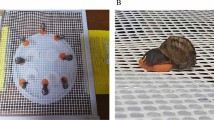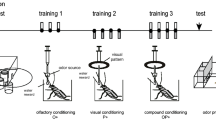Abstract
The dopamine agonist apomorphine elicits protracted pecking when injected systemically (1 mg/kg) into pigeons. In two experiments it was investigated whether apomorphine would function as an unconditioned stimulus in the classical conditioning of pecking in these animals. An experimental design based on a differentiation procedure was used so that possible pseudoconditioning effects were controlled. Two differently coloured test chambers served as negative (CS-) and positive conditioned (CS+) stimuli. During the training phase the subjects experienced the former while injected with saline, and the latter while injected with apomorphine. In later tests not involving any injections the pigeons made significantly more pecks (conditioned response) in the CS+ chamber than in the CS-chamber. In the first and second experiments the conditioned stimuli were, respectively, discrete and diffuse visual cues, but both had similar effects. The conditioning obtained may explain sensitization effects that are observed with repeated apomorphine injections. Apomorphine probably also functions as a positive reinforcer for instrumental conditioning in pigeons.
Similar content being viewed by others
References
Amsler C (1923) Beiträge zur pharmakologie des Gehirns. Arch Exp Pathol Pharmakol 97:1–27
Basten-Kreft A (1977) Apomorphin-induziertes Verhalten bei Tauben. Diplomarbeit, Ruhr-Universität, Bochum
Baxter BL, Gluckman MI, Stein L, Scerni RA (1974) Self-injection of apomorphine in the rat: positive reinforcement by a dopamine receptor stimulant. Pharmacol Biochem Behav 2:387–392
Brunelli M, Magni F, Moruzzi G, Musumeci D (1975) Apomorphine pecking in the pigeon. Arch Ital Biol 113:303–325
Carey RJ (1986) Conditioned rotational behavior in rats with unilateral 6-hydroxydopamine lesions of the substantia nigra. Brain Res 365:379–382
Costentin J, Protais P, Schwartz JC (1975) Rapid and dissociated changes in sensitivities of different receptors in mouse brain. Nature 257:405–407
Davey G (1981) Animal learning and conditioning. Macmillan, London
Delius JD (1985) The peck of the pigeon: free for all. In: Lowe CF, Richelle M, Blackman DE, Bradshaw CM (eds) Behaviour analysis and contemporary psychology. Erlbaum, New York, pp 53–81
Deviche P (1984) Administration of small doses of apomorphine attenuates feeding in non-deprived pigeons. Physiol Behav 33:581–585
Ellinwood EH (1971) “Accidental conditioning” with chronic methamphetamine intoxication: implications for a theory of drug habituation. Psychopharmacology 21:131–138
Garcia J, Ervin FR, Koelling RA (1966) Learning with long delay of reinforcement. Psychon Sci 5:121–123
Lindenblatt U (1986) Die dopaminerge Auslösung des Pickverhaltens bei Tauben. Dissertation, Ruhr-Universität, Bochum
Machlis L (1980) Apomorphine: effects on the timing and sequencing of pecking behavior in chicks. Pharmacol Biochem Behav 13:331–336
Pavlov IP (1927) Conditioned reflexes (G.V. Anrep. transl.) Oxford University Press, London
Siegel S (1982) Pharmacological habituation and learning. In: Commons ML, Herrnstein RI, Wagner AR (eds) Quantitative analyses of behavior III: Acquisition. Ballinger, Cambridge, Massachusetts, pp 195–217
Tilson HA, Rech H (1973) Conditioned drug effects and absence of tolerance to d-apomorphine induced motor activity. Pharmacol Biochem Behav 1:149–153
Author information
Authors and Affiliations
Rights and permissions
About this article
Cite this article
Lindenblatt, U., Delius, J.D. Apomorphine-induced pecking in pigeons classically conditioned to environmental cues. Psychopharmacology 93, 223–225 (1987). https://doi.org/10.1007/BF00179938
Received:
Revised:
Issue Date:
DOI: https://doi.org/10.1007/BF00179938




